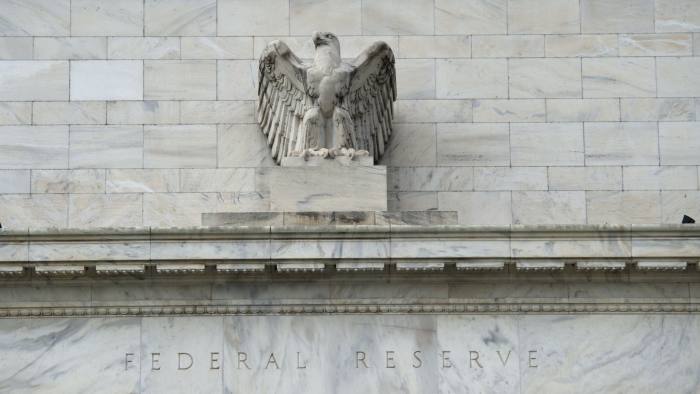Fed needs to wake up and admit the economy is overheating
US central bank risks having to slam on the brakes if it persists with gradualism
Jason Cummins

In Newton’s First Law, an object in motion stays in motion until a force acts upon it. Under new leadership, the Federal Reserve’s monetary policy strategy appears to be following the same logic. In his June press conference, chairman Jay Powell said the Fed would raise interest rates until “we get a sense that the economy is reacting badly”.
The latest numbers suggest the US economy is doing anything but reacting badly. The unemployment rate declined to 3.75 per cent, a 48-year low and three-quarters of a percentage point below the Fed’s median estimate of its long-run sustainable rate. Consumer prices rose 2.3 per cent in May from a year earlier. Excluding volatile food and energy categories, core personal consumption expenditures inflation moved up to 2 per cent, matching the Fed’s target for the first time in more than six years.
Despite downside risks from trade tension, these trends look set to continue. Monetary policy is still expansionary on top of the sizeable fiscal expansion that will build in the coming years. The labour market is poised to get tighter and put continued upward pressure on inflation.
With its latest increase in the federal funds rate to a range of 1.75 per cent to 2 per cent, the Fed has finally brought real interest rates to approximately zero. With further gradual increases every quarter, interest rates would end the year at the lower end of Fed policymakers’ range of neutral — ie, the rate that neither stimulates nor slows economic activity. Given the gradual pace outlined in the Fed’s Summary of Economic Projections, monetary policy would eventually become modestly restrictive sometime in 2019 or later.
Mission accomplished? Economic theory and history suggest otherwise. With long and variable lags between monetary policy and its effect on economic activity, theory teaches that interest rates need to be restrictive before the economy overheats. The likelihood is the Fed will enable an even hotter economy and then really have to cool it down. With markets discounting an even more gradual path of rate rises, the central bank risks a sharp financial snap back when it has to slam on the brakes.
International financial markets are responding to the prospect of tighter US monetary policy by bidding up the value of the US dollar against other currencies. In the past, this has been a key catalyst for international financial crises.
With the Fed raising rates and the People’s Bank of China cutting reserve requirements in June, the renminbi slid more than 3 per cent against the US dollar, its largest ever monthly drop for the tightly managed currency. Continued depreciation risks a replay of the destabilising capital outflows seen in 2015 when US and Chinese monetary policies also diverged. At that time, a mild financial panic that played out into early 2016 stoked fears of global recession.
Elsewhere in emerging markets, central banks are under pressure to respond to a stronger US dollar by defending their currencies with rate rises. The most vulnerable economies like Argentina and Turkey already demonstrated acute strain with sharp depreciations in their currencies and capital outflows.
It’s not just the most mismanaged economies that are vulnerable. Indonesia surprised the market by raising rates 50 basis points last month. Mexico is raising rates to defend its currency and some observers think the next move in Brazil will have to be a hike as well. In these countries, equity markets are down on the year and the appreciation in the US currency is making it harder for domestic borrowers to pay back more expensive dollar-denominated debt.
Back home, the Fed has largely shrugged off the international consequences of its actions. Gradualism seems to pose manageable risks because inflation only recently hit 2 per cent and probably will remain contained in the near-term given how flat the Phillips curve appears to be.
Unfortunately, history teaches that the Fed has never successfully managed a soft landing with the current set of macroeconomic conditions. In every case when the Fed tightened policy by enough to raise the unemployment rate by more than four-tenths of a percentage point, it caused a recession.
However, Powell said at his last press conference that it’s “very possible” the long-run sustainable unemployment rate is lower than 4.5 per cent. There is surely uncertainty about the unobservable variables that guide policy. But, if there’s uncertainty, why conduct policy as if the true value is 75 basis points or more below your official estimate?
A high-pressure economy feels great during the party. But the recessionary hangover can be brutal. A better strategy would be more forward-looking. Recognise the economy is overheating rather than hoping that it’s not, announce that policy will need to be more restrictive sooner than expected, and get on with it. Policymakers would have to endure some pain in the short run as they realign market expectations to a more hawkish rate path. But that’s better than the gradualism that virtually guarantees a larger, more painful realignment later on.
Jason Cummins is chief US economist at Brevan Howard
0 comments:
Publicar un comentario